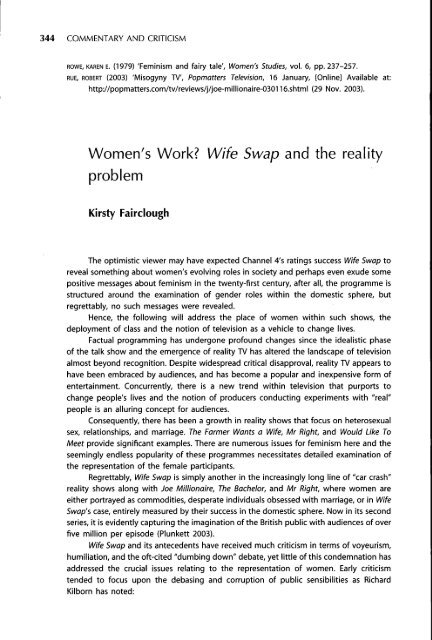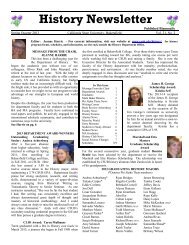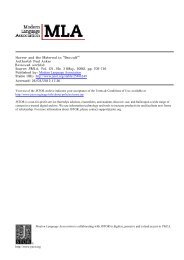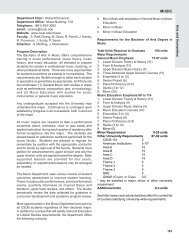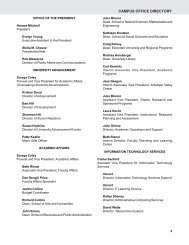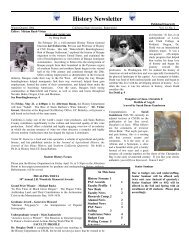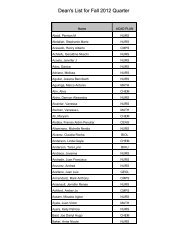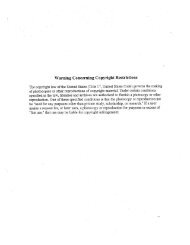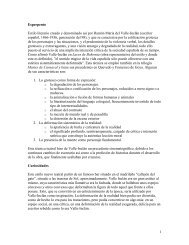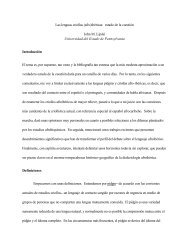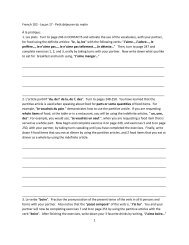Article 1: "Women's Work: Wife Swap and the Reality Problem."
Article 1: "Women's Work: Wife Swap and the Reality Problem."
Article 1: "Women's Work: Wife Swap and the Reality Problem."
You also want an ePaper? Increase the reach of your titles
YUMPU automatically turns print PDFs into web optimized ePapers that Google loves.
344 COMMENTARY AND CRITICISM<br />
ROWE, KAREN E, (1979) 'Feminism <strong>and</strong> fairy tale'. <strong>Women's</strong> Studies, vol, 6, pp. 237-257,<br />
RUE, ROBERT (2003) 'Misogyny TV', Popmatters Television, 16 January, [Online] Available at:<br />
http://popmatters,com/tv/reviews/j/joe-millionaire-030116.shtml (29 Nov, 2003).<br />
<strong>Women's</strong> <strong>Work</strong>? <strong>Wife</strong> <strong>Swap</strong> <strong>and</strong> <strong>the</strong> reality<br />
problem<br />
Kirsty Fairclough<br />
The optimistic viewer may have expected Channel 4's ratings success <strong>Wife</strong> <strong>Swap</strong> to<br />
reveal something about women's evolving roles in society <strong>and</strong> perhaps even exude some<br />
positive messages about feminism in <strong>the</strong> twenty-first century, after all, <strong>the</strong> programme is<br />
structured around <strong>the</strong> examination of gender roles within <strong>the</strong> domestic sphere, but<br />
regrettably, no such messages were revealed.<br />
Hence, <strong>the</strong> following will address <strong>the</strong> place of women within such shows, <strong>the</strong><br />
deployment of class <strong>and</strong> <strong>the</strong> notion of television as a vehicle to change lives.<br />
Factual programming has undergone profound changes since <strong>the</strong> idealistic phase<br />
of <strong>the</strong> talk show <strong>and</strong> <strong>the</strong> emergence of reality TV has altered <strong>the</strong> l<strong>and</strong>scape of television<br />
almost beyond recognition. Despite widespread critical disapproval, reality TV appears to<br />
have been embraced by audiences, <strong>and</strong> has become a popular <strong>and</strong> inexpensive form of<br />
entertainment. Concurrently, <strong>the</strong>re is a new trend within television that purports to<br />
change people's lives <strong>and</strong> <strong>the</strong> notion of producers conducting experiments with "real"<br />
people is an alluring concept for audiences.<br />
Consequently, <strong>the</strong>re has been a growth in reality shows that focus on heterosexual<br />
sex, relationships, <strong>and</strong> marriage. The Farmer Wants a <strong>Wife</strong>, Mr Right, <strong>and</strong> Would Like To<br />
Meet provide significant examples. There are numerous issues for feminism here <strong>and</strong> <strong>the</strong><br />
seemingly endless popularity of <strong>the</strong>se programmes necessitates detailed examination of<br />
<strong>the</strong> representation of <strong>the</strong> female participants.<br />
Regrettably, <strong>Wife</strong> <strong>Swap</strong> is simply ano<strong>the</strong>r in <strong>the</strong> increasingly long line of "car crash"<br />
reality shows along with Joe Millionaire, The Bachelor, <strong>and</strong> Mr Right, where women are<br />
ei<strong>the</strong>r portrayed as commodities, desperate individuals obsessed with marriage, or in <strong>Wife</strong><br />
<strong>Swap</strong>'s case, entirely measured by <strong>the</strong>ir success in <strong>the</strong> domestic sphere. Now in its second<br />
series, it is evidently capturing <strong>the</strong> imagination of<strong>the</strong> British public with audiences of over<br />
five million per episode (Plunkett 2003).<br />
<strong>Wife</strong> <strong>Swap</strong> <strong>and</strong> its antecedents have received much criticism in terms of voyeurism,<br />
humiliation, <strong>and</strong> <strong>the</strong> oft-cited "dumbing down" debate, yet little of this condemnation has<br />
addressed <strong>the</strong> crucial issues relating to <strong>the</strong> representation of women. Early criticism<br />
tended to focus upon <strong>the</strong> debasing <strong>and</strong> corruption of public sensibilities as Richard<br />
Kilborn has noted:
COMMENTARY AND CRITICISM 345<br />
The audience can sometimes be manoeuvred into eavesdropping positions <strong>and</strong> allowed<br />
to witness events in ways which p<strong>and</strong>er to less desirable traits in human nature. There<br />
is in o<strong>the</strong>r words, a quite underst<strong>and</strong>able fear that reality programming if taken to <strong>the</strong><br />
extreme, embodies <strong>the</strong> worst kind of common denominator TV. (Richard Kilborn 1994,<br />
• p. 427)<br />
This is also evident more recently in <strong>the</strong> broadsheet press:<br />
These "humiliation shows" have re-ignited <strong>the</strong> debate over st<strong>and</strong>ards in television.<br />
Ministers, psychologists <strong>and</strong> even some programme-makers have condemned <strong>the</strong>m as<br />
"sick-making". Producers <strong>and</strong> directors admit <strong>the</strong> shows are sadistic but say celebrities<br />
<strong>and</strong> members of <strong>the</strong> public are "queuing up" to take part. (John Arlidge 2003)<br />
Such criticism is part of a long tradition of cultural commentators bemoaning <strong>the</strong><br />
effects of television <strong>and</strong> expressing a parental concern for <strong>the</strong> audience. Conversely, in<br />
<strong>the</strong> 1990s, feminist critics such as Jane Shattuc (1997) championed popular television <strong>and</strong><br />
talk shows in particular as a positive forum for <strong>the</strong> examination of women's issues.<br />
Unfortunately, after <strong>the</strong> quantifiable progress that has been made in terms of <strong>the</strong><br />
representation of women within visual media, a programme such as <strong>Wife</strong> <strong>Swap</strong> is<br />
intrinsically negative <strong>and</strong> even threatens to undo this progress due to its harking back to<br />
an outdated <strong>and</strong> conservative representation of wives <strong>and</strong> mo<strong>the</strong>rs.<br />
<strong>Wife</strong> <strong>Swap</strong>'s premise is a vicious one, staged so that <strong>the</strong> women are positioned<br />
against each o<strong>the</strong>r from <strong>the</strong> outset, <strong>and</strong> naturally <strong>the</strong> situation is exacerbated to make<br />
"good TV." The programme makers have clearly designed a format to create conflict but<br />
surreptitiously hide behind a seemingly observational mode. Predictably, <strong>the</strong> couples are<br />
chosen in terms of <strong>the</strong>ir social status <strong>and</strong> class issues are <strong>the</strong> unspoken basis for selection.<br />
The female participants are often represented as pushy, domineering or stupid. Most<br />
episodes conclude with <strong>the</strong> husb<strong>and</strong>s looking on innocently as <strong>the</strong>ir wives attack each<br />
o<strong>the</strong>r's lifestyles <strong>and</strong> furiously defend <strong>the</strong>ir own. For instance, series one saw Kate, a<br />
housewife <strong>and</strong> mo<strong>the</strong>r of six, sneer at Tracey, her career-focused counterpart "for a<br />
woman to fail as a housewife is ridiculous."<br />
Compelling as this may be. <strong>Wife</strong> <strong>Swap</strong> achieves nothing except to fur<strong>the</strong>r emphasise<br />
<strong>the</strong> fact that women should be natural homemakers by virtue of <strong>the</strong>ir gender <strong>and</strong><br />
confirms <strong>the</strong> notion that <strong>the</strong>re is little positive about <strong>the</strong>se types of outmoded gender<br />
stereotypes.<br />
The questions that <strong>Wife</strong> <strong>Swap</strong> calls forth are many. Not least, are <strong>the</strong> participants<br />
really representative of <strong>the</strong> way most couples still operate, with <strong>the</strong> men portrayed as<br />
doing little of <strong>the</strong> domestic work <strong>and</strong> often emerging from <strong>the</strong> programme as heroes,<br />
whilst <strong>the</strong> women appear as ei<strong>the</strong>r impossibly controlling or exploited doormats?<br />
The premise of <strong>the</strong> series is based exclusively around <strong>the</strong> women's place in <strong>the</strong><br />
home <strong>and</strong> any reference to careers <strong>and</strong> <strong>the</strong> workplace is inconsistent <strong>and</strong> alarmingly<br />
limited. Indeed, <strong>the</strong> programme makers have an incoherent attitude towards <strong>the</strong> women<br />
by representing only half of <strong>the</strong>ir lives. Allusion to <strong>the</strong> women's jobs is often portrayed<br />
as troublesome, an interference in <strong>the</strong> lives of those who have to live with <strong>the</strong>m. In <strong>the</strong><br />
first series, one woman's career was unashamedly used as an attack on working mo<strong>the</strong>rs<br />
<strong>and</strong> appeared to confirm <strong>the</strong> belief that women simply cannot have it all. This episode<br />
was particularly troubling <strong>and</strong> highlighted fur<strong>the</strong>r <strong>the</strong> continued struggle that women still
346 COMMENTARY AND CRITICISM<br />
have to negotiate at home, at work, <strong>and</strong> within society at large. It appears that according<br />
to television producers, <strong>the</strong> division of household chores, personal habits, taste, <strong>and</strong><br />
parenting are <strong>the</strong> new battlefields in which women are contesting <strong>the</strong>ir homes, marriages,<br />
<strong>and</strong> self-esteem.<br />
There is occasionally, a weak attempt at highlighting <strong>the</strong> oppression of women by<br />
<strong>the</strong>ir domineering husb<strong>and</strong>s. In series one, Michelle swaps with Carole, whose husb<strong>and</strong><br />
Peter appears as an enlightened "new man." Michelle is married to Barry, a difficult,<br />
insecure, <strong>and</strong> domineering individual. Humiliation is key, <strong>and</strong> admittedly, Michelle's<br />
husb<strong>and</strong> Barry is amusingly officious, but <strong>the</strong> overt humiliation of Michelle's decision to<br />
live with this man smacks of middle-class snobbery. This humiliation is concealed in a veil<br />
of self-discovery for <strong>the</strong> participant <strong>and</strong> presumes that <strong>the</strong> audience will learn something<br />
from watching <strong>the</strong> misery <strong>and</strong> embarrassment of o<strong>the</strong>rs.<br />
Yet <strong>Wife</strong> <strong>Swap</strong> has become something of a cultural phenomenon which has<br />
galvanised <strong>the</strong> press, not due to its negative portrayal of wives <strong>and</strong> mo<strong>the</strong>rs, but because<br />
of <strong>the</strong> overt class warfare on display. Indeed, class appears to be an increasingly popular<br />
<strong>the</strong>me within reality TV. Recent programmes including Dinner Party Inspectors, Holiday<br />
Showdown, <strong>and</strong> Take My Mo<strong>the</strong>r-in-Law use class as <strong>the</strong> underpinning force for conflict.<br />
The premise of <strong>the</strong>se shows is an arrogant one which invites <strong>the</strong> viewer to delight in<br />
sneering at <strong>the</strong> working classes in a way that hasn't been acceptable since <strong>the</strong> 1950s.<br />
This class conflict appears to be key to <strong>the</strong> success of <strong>Wife</strong> Svi/ap. What becomes<br />
clear is that <strong>the</strong> lower middle classes are positioned as educating <strong>the</strong> earthy, raucous<br />
working classes about social etiquette <strong>and</strong> <strong>the</strong> working classes often exhibit more<br />
emotion <strong>and</strong> warmth for <strong>the</strong>ir children than <strong>the</strong>ir aspirational counterparts. Or as<br />
Guardian journalist Zoe Williams asserts, "It's an old-school morality tale that starts off<br />
with how frightful <strong>the</strong> working classes are, <strong>the</strong>n winds us round to <strong>the</strong> inevitable<br />
conclusion that, hey, <strong>the</strong>y may be poor, but <strong>the</strong>y're good <strong>and</strong> <strong>the</strong>y're happy" (Zoe<br />
Williams 2003).<br />
The range of class fractions on display is palpable, <strong>the</strong> lower middle-class women<br />
are often portrayed as seeking to distance <strong>the</strong>mselves from <strong>the</strong> working-class women <strong>and</strong><br />
this is of course where conflict is fashioned <strong>and</strong> played out. Indeed, <strong>the</strong> representation of<br />
wives <strong>and</strong> mo<strong>the</strong>rs within this class war is repeatedly outdated <strong>and</strong> unnecessary.<br />
Despite <strong>the</strong> misguided naivety that <strong>Wife</strong> <strong>Swap</strong> may be more than cheap entertainment,<br />
it ultimately reveals little about changing social attitudes towards men <strong>and</strong><br />
women's roles in <strong>the</strong> domestic sphere, is decidedly unconcerned with how gender is<br />
negotiated, contested, <strong>and</strong> reconfigured across media forms, <strong>and</strong> simply reinforces <strong>the</strong><br />
outdated stereotype that a woman's place really should be in <strong>the</strong> home. One can only<br />
hope that <strong>the</strong> overall message arising from <strong>Wife</strong> <strong>Swap</strong> is that feminism is not only relevant<br />
in contemporary society, but absolutely essential.<br />
REFERENCES<br />
ARUDGE, JOHN (2003) 'Cruelty TV', The Observer, 18 May, [Online] Available at: http://<br />
observer,guardian.co.uk/focus/story/0,6903,958246,00,html<br />
THE BACHELOR (television series) ABC,<br />
DINNER PARTY INSPECTORS (television Series) BBC2.<br />
THE FARMER WANTS A WIFE (television Series) ITV.<br />
HOLIDAY SHOWDOWN (television series) ITV.<br />
JOE MILLIONAIRE (television series) Fox.
COMMENTARY AND CRITICISM 347<br />
KILBORN, RICHARD (1994) 'How real can you get: recent developments in reality television',<br />
European Journai of Communication, vol. 9, no. 4, p, 427.<br />
MR R/GHT (television series) ITV.<br />
PLUNKETT, JOHN (2003) The Guardian, 29 January.<br />
SHATTUC, JANE (1997) The Talking Cure: Television Talk Shows <strong>and</strong> Women, Routledge, London.<br />
TAKE MY MOTHER-IN-LAW {te\e\/\s\or\ series) ITV.<br />
WIFE SWAP (television series) Channel 4,<br />
WILLIAMS, ZOE (2003) 'Bride <strong>and</strong> prejudice'. The Guardian, ^ 1 November, [Online] Available at:<br />
http://guardian,co,uk/comment/story/0,,1082297,00.html<br />
WOULD LIKE TO MEET (television series) BBC 2,<br />
Taking <strong>the</strong> Nation "From Drab to Fab":<br />
Queer Eye for <strong>the</strong> Straight Guy<br />
Dana Heller<br />
A distinctive sub-genre of reality television, makeover shows invite us to participate<br />
in a fantasy of physical <strong>and</strong> social transformation, <strong>the</strong> complex cultural origins of which<br />
connect to myths of American immigration, evangelicalism, <strong>and</strong> expansionism. Robert<br />
Thompson, Director of <strong>the</strong> Center for <strong>the</strong> Study of Popular Television at Syracuse<br />
University, summarizes <strong>the</strong>se connections in a word:<br />
If you had to describe <strong>the</strong> American mythos in one single word, "reinvention" really<br />
would not be a bad choice. One could argue that from <strong>the</strong> time of <strong>the</strong> Pilgrims' arriving<br />
at Plymouth Rock, a lot of at least <strong>the</strong> European settlement story of America has been<br />
about reinvention, leaving <strong>the</strong> Old World for <strong>the</strong> New. It's American culture as <strong>the</strong><br />
annihilation of history, of <strong>the</strong> past.... In a very real sort of way, <strong>the</strong> history of <strong>the</strong> United<br />
States is one big fat makeover show. (Thompson cited in The Chronicle of Higher<br />
Education 2003, p, B4)<br />
What Thompson's observation does not explicitly account for are <strong>the</strong> gendered,<br />
racialized, <strong>and</strong> sexualized notions of self-realization, appearance, <strong>and</strong> pleasure that inform<br />
<strong>the</strong> "big fat makeover" o<strong>the</strong>rwise known as American history. Makeover industries that<br />
address white middle-class women as <strong>the</strong>ir principal clients <strong>and</strong> offer feminine instruction<br />
<strong>and</strong> advice in physical appearance <strong>and</strong> lifestyle remained staples of nineteenth- <strong>and</strong><br />
twentieth-century popular culture, from magazines such as Ladies Home Journai, to 1950s<br />
television shows such as Queen for a Day, to lifestyle gurus such as Jane Fonda <strong>and</strong><br />
Martha Stewart, Of course, <strong>the</strong>re are many exceptions to <strong>the</strong>se structures of address <strong>and</strong><br />
identification in makeover marketing, evident in <strong>the</strong> history of "Charles Atlas" (born<br />
Angelo Siciliano, an Italian immigrant) <strong>and</strong> <strong>the</strong> men's body-building culture he helped<br />
spawn, <strong>the</strong> popularity of African-American lifestyle magazines such as Ebony, <strong>and</strong> <strong>the</strong><br />
indeterminate number of men <strong>and</strong> women, gay <strong>and</strong> straight, who have enjoyed exercis-


